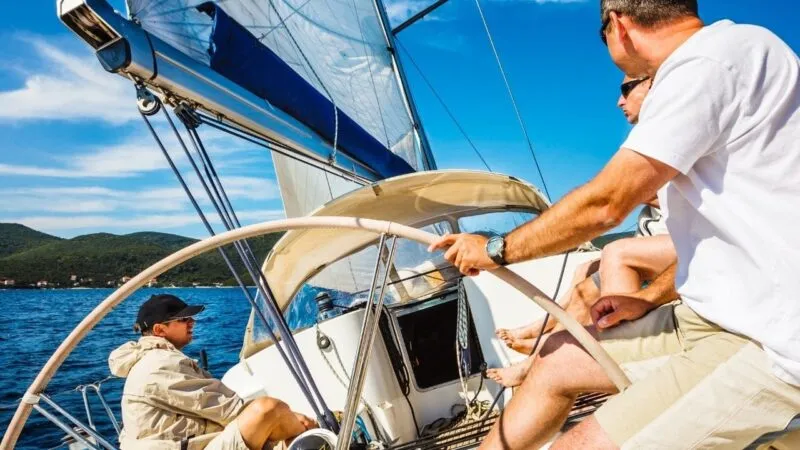/Afloat On A Boat Gallery – Afloat On A Boat & Underway? Post Your Boat Today!

The image depicts a serene scene of a solitary sailboat navigating through a tranquil sea at sunset, with a symbolic compass and a gavel subtly incorporated, underscoring the essence of maritime law within the realm of recreational boating.
Meta Description
Dive into the complex waters of maritime law as it applies to recreational boaters in this engaging blog post. Uncover the legal intricacies that every boat enthusiast must know to sail confidently and responsibly.
Welcome aboard the intricate sea of rules and regulations that govern our oceans and waterways! As you set out to enjoy the freedom of the waves, it’s essential to understand the maritime law that applies to recreational boating. While the prospect of legal guidelines may seem daunting, this guide aims to navigate you through the calm and stormy waters of compliance, ensuring a sailing experience that’s both enjoyable and law-abiding.
The Basics of Maritime Law
Maritime law, also known as admiralty law, is a distinct body of law that governs nautical issues and private maritime disputes. For recreational boaters, it covers a wide range of aspects, from vessel registration to safety regulations. Familiarizing yourself with these key areas can prevent unexpected encounters with law enforcement and safeguard your seaworthy adventures:
- Vessel Registration: Ensure your boat is registered with the appropriate state or national body, as this is mandatory for most vessels.
- Boating License: Depending on where you sail, you might be required to have a boating license or take a safety course.
- Safety Equipment: Regulations stipulate certain safety gear must be on board, such as life jackets and fire extinguishers.
- Navigation Rules: Familiarize yourself with the ‘Rules of the Road’ (USCG Navigation Rules) to prevent collisions and mishaps on the water.
Navigational Rights and Responsibilities
The freedom of the open water doesn’t mean a free-for-all. Recreational boaters must understand their navigational rights and responsibilities to ensure safety and compliance. This includes respecting speed limits, no-wake zones, and the marine environment. The United Nations Convention on the Law of the Sea (UNCLOS) provides a framework for maritime conduct that all seafarers should be aware of.
International Waters and Local Jurisdictions
While cruising the high seas, boaters might cross into international waters where different rules apply. It’s crucial to recognize that once you leave territorial waters, generally 12 nautical miles from the coast, you’re subject to international maritime law. Moreover, if you plan to dock in a foreign port, local laws and customs will come into play. Always check the Noonsite for country-specific boating regulations before embarking on an international voyage.
Environmental Considerations
Recreational boating also carries an environmental responsibility to protect the marine habitats we cherish. Regulations such as waste disposal, discharge restrictions, and protected area rules are designed to minimize the ecological footprint of boating activities. Agencies like the Environmental Protection Agency (EPA) and the National Oceanic and Atmospheric Administration (NOAA) provide guidelines to help boaters preserve our waterways for future generations.
Consequences of Non-Compliance
Failing to adhere to maritime laws can lead to serious consequences, including fines, vessel seizure, and in some cases, criminal charges. The U.S. Coast Guard actively enforces maritime law, ensuring that waterways remain safe and navigable for all.
Staying Informed
Maritime law is not static; it evolves with the changing seascape of technology, environmental issues, and international relations. Resources such as the International Maritime Organization (IMO) provide updates on regulations and best practices. Remember to subscribe to our email list for regular content updates on maritime topics that could affect your boating lifestyle.
As you prepare to cast off, remember that Afloat On A Boat Gallery is more than a showcase of maritime beauty; we are a community dedicated to promoting responsible and informed boating. Share your experiences and pictures with us, and join a fellowship of boaters who respect the laws that keep our voyages safe and enjoyable. Fair winds and following seas!








Thank you for your sharing. I am worried that I lack creative ideas. It is your article that makes me full of hope. Thank you. But, I have a question, can you help me?
Can you be more specific about the content of your article? After reading it, I still have some doubts. Hope you can help me.